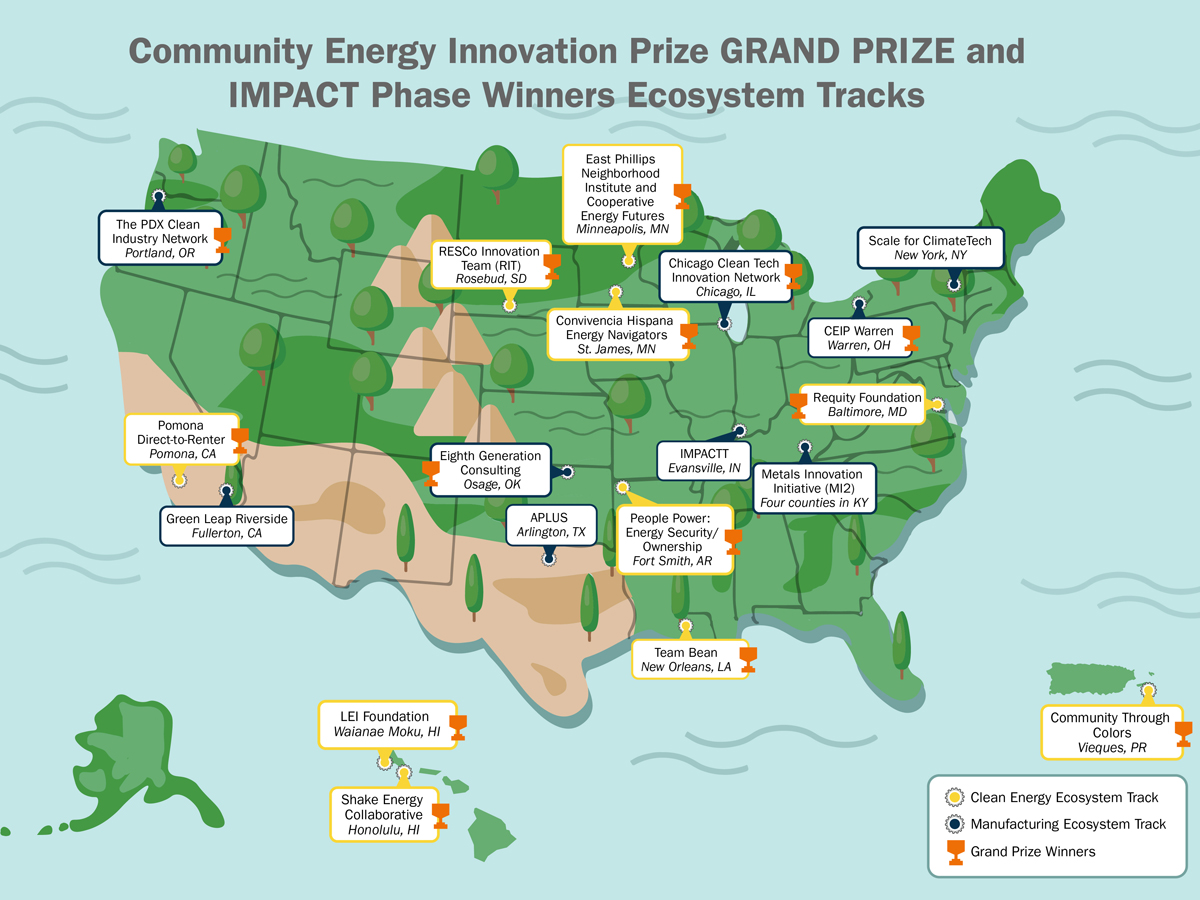Bridging the Gap: DOE's Trailblazing Prize Energizes Underserved Communities with Clean Innovation
Jo-Carolyn Goode | 12/6/2024, 12:07 p.m.
In a dazzling display of innovation and community-focused action, the U.S. Department of Energy (DOE) has made a significant leap toward equity in clean energy. The culmination of the Community Energy Innovation Prize has ushered in a brighter future, awarding over $2 million to 19 ambitious teams committed to reshaping underserved communities through clean energy and manufacturing innovation.
The winners of the prize’s IMPACT Phase weren’t just competing—they were pioneering solutions to transform their neighborhoods. From energy-efficient appliances for low-income households in California to reinvigorating coal communities in Kentucky with metals manufacturing jobs, these projects are setting the bar high for creativity and impact. The awards ranged from $10,000 to an impressive $310,000, rewarding teams based on their strategic partnerships and measurable community influence.
Jeff Marootian, Principal Deputy Assistant Secretary for DOE’s Office of Energy Efficiency and Renewable Energy, captured the spirit of the event, stating:
"These teams have enacted creative plans to address local challenges and improve the lives of people across America."

Clean Energy Ecosystem Track
- Requity Foundation (Baltimore, Maryland) awarded $310,000
- Community Through Colors (Vieques, Puerto Rico) awarded $310,000
- East Phillips Neighborhood Institute (EPNI) and Cooperative Energy Futures (CEF) (Minneapolis, Minnesota) awarded $160,000
- People Power: Energy Security/Ownership (Fort Smith, Arkansas) awarded $160,000
- Team Bean (New Orleans, Louisiana) awarded $160,000
- Convivencia Hispana Energy Navigator (St. James, Minnesota) awarded $100,000
- Shake Energy Collaborative (Honolulu, Hawaii) awarded $100,000
- LEI Foundation (Waianae Moku, Hawaii) awarded $100,000
- Pomona Direct-to-Renter (Pomona, California) awarded $100,000
- RESCo Innovation Team (RIT) (Rosebud, South Dakota) awarded $100,000
Manufacturing Ecosystem Track
- Eighth Generation Consulting (Osage, Oklahoma) awarded $260,000
- The PDX Clean Industry Network (Portland, Oregon) awarded $110,000
- CEIP Warren (Warren, Ohio) awarded $110,000
- Clean Tech Innovation Network (Chicago, Illinois) awarded $60,000
- Green Leap Riverside (Fullerton, California) awarded $10,000
- APLUS (Arlington, Texas) awarded $10,000
- IMPACTT (Evansville, Indiana) awarded $10,000
- Metals Innovation Initiative (MI2) (Four counties in Kentucky) awarded $10,000
- Scale for ClimateTech (New York City, New York) awarded $10,000
A Celebration of Vision and Collaboration
The Community Energy Innovation Summit, held at the University of Illinois Chicago, was more than a gathering; it was a meeting of minds determined to create change. Over 170 community leaders, students, and policy advocates came together to celebrate the achievements of these innovative teams. They shared strategies, explored funding opportunities, and forged connections to bolster clean energy initiatives.
Among the Manufacturing Ecosystem standouts was Eighth Generation Consulting of Osage, Oklahoma, walking away with a hefty $260,000 to fuel its forward-thinking projects. Meanwhile, Portland’s PDX Clean Industry Network secured $110,000, and Clean Tech Innovation Network in Chicago claimed $60,000, further proving that innovation thrives when backed by vision and support.
In the Clean Energy Ecosystem Track, the Requity Foundation of Baltimore and Puerto Rico’s Community Through Colors each earned $310,000 for their transformative projects. From Minnesota to Louisiana, teams harnessed the power of community engagement to tackle challenges, from workforce training to the deployment of groundbreaking energy technologies.
Beyond Awards: Building a Movement
The DOE’s Community Energy Innovation Prize doesn’t just reward innovation—it builds capacity for lasting change. The initiative has already invested nearly $7.5 million across its phases, funding projects that range from mentoring university students to developing local clean energy workforces. At its heart, the program is about ensuring historically underrepresented communities have a seat at the clean energy table.
This effort is supported by DOE’s Integrated Strategies Office, Advanced Materials and Manufacturing Technologies Office, and Office of Energy Justice and Equity, with administration by the National Renewable Energy Laboratory.
Why This Matters to Houston
Houston, often referred to as the Energy Capital of the World, has a vested interest in these innovations. As the city faces mounting challenges from climate change and economic disparities, the lessons from the Community Energy Innovation Prize resonate deeply. Imagine the possibilities: clean energy hubs empowering Houston’s underserved communities, job creation through sustainable manufacturing, and education programs transforming the next generation of energy leaders.
For Houstonians, this isn’t just a national story—it’s a blueprint for what’s possible when innovation and equity go hand-in-hand.
The Road Ahead
The DOE’s Community Energy Innovation Prize is more than a celebration of ingenuity; it’s a call to action. As the country pivots toward a cleaner, more sustainable future, the stories of these winning teams illuminate the path forward.
For updates on future challenges and to learn more about the winning projects, visit the prize's HeroX page.
Please follow the challenge on HeroX for future updates.
The Community Energy Innovation Prize is funded by the Integrated Strategies Office and Advancing Materials and Manufacturing Technologies Office within DOE's Office of Energy Efficiency and Renewable Energy, in addition to DOE's Office of Energy Justice and Equity. The prize is administered by the National Renewable Energy Laboratory through DOE's America-Made Challenges program.




